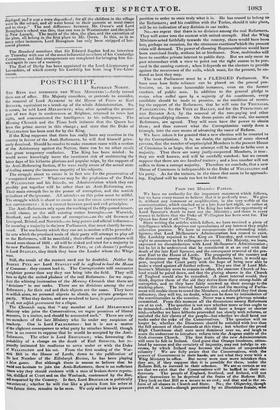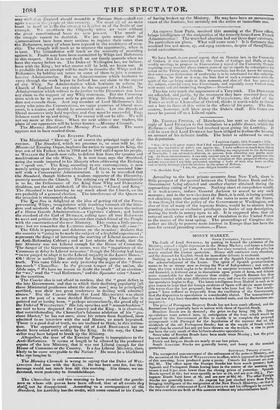Faom THE MORNING PAPERS.
We have no authority for the important statement which follows, but we have every reason to believe that it is perfectly true. We give it, without any comment or amplification, in the very wotds of the communication, which reached us at a late hour last night, or rather 4 an early hour this morning :—" The King has taken the opportunity of Lord Spencer's death to turn out the Ministry ; and there is every reason to believe that the Duke of Wellington has been sent for. The Queen has done it Times.
Since writing the articles which follow, we have received a piece of intelligence which deprives our speculations of any interest they might otherwise possess. We have to communicate the astounding intel- ligence,. that Lord Melbourne's Administration has ceased to exist. His Lordship repaired to the King on Thursday, and returned last night to announce to his colleagues the event. His Majesty, we learn, expressed no dissatisfaction with Lord Melbourne's Administration ; but he let it be understood that he considered it at an end with the' death of the late Earl Spencer, and the consequent removal of the pre. sent Earl to the House of Lords. The prosperity of the country and the dissensions among the Whigs and Reformers, have, it would ap- pear, inspired the Court party with the hope of being now able to make a stand against all further reform. They see that if Lord Mel- bourne's Ministry were to remain in office, the sinecure Church of Ire- land would be pared down, and that the glaring abuses in the Church of England would also be remedied. A short interval would, they think, deprive them of the aid they derive from these strong-holds of corruption, and so they have fairly screwed up their courage to the sticking-place. The interval between this and the meeting of Parlia- ment will enable them to sound the Members ; and should they find them refractory, they will try, no doubt, what can be done by intimidation of ' the constituencies in the counties. Never was a more grievous mistake committed. From this moment all the dissensions among Reformers are at an end. The question is not now whether more or less ought to be demanded—whether the Lords should have a longer or shorter trial—whether we have hitherto proceeded too slowly with reforms, or satisfied the fair claims of the people—but whether we shall bend our necks under the yoke of the Conservatives. The question will no longer be, whether the Dissenters should be satisfied with less than the full amount of their demands at this time; but whether the proud High Churchman shall once more domineer over us, and laugh to scorn the endeavour to introduce reform into the Aegean stable of the Irish sinecure Church. The first fruits of the new Administration will soon be felt in Ireland. God grant that Orange insolence, stimu- lated by success and the certainty of impunity, may not indulge in ex- cesses, by which Ireland may become the theatre of unspeakable calamity ! We are fully aware that the Conservatives, with the powers of Government in their hands, are not what they were With a Whig Ministry in office. But never were men more mistaken than they are, if they suppose that it is possible for them, under the Reform Bill, to succeed in their schemes. We are as certain as we are that we exist that the Conservatives will be baffled in their ema deavours. The people of England, Scotland, and Ireland, will not allow themselves to be deprived of the fruits of the Reform Bill. They look on that Bill as a means to an end ; and that end is the re- form of all abuses in Church and State. No; the Oligarchy, though powerful at Court—though patronized by an illustrious female, who
may wi.b ti at Elielited should resemItle a German State—eball rot
agaiii • •ie the i,eople tit this ceuntly. We enist all of us unite heart in hold to la file the attempt to (1, psi ve us of the fruits of our triumph. We overthrew the Oligarchy when we were without
the great constitutional boon we now pos,ess. The result of the struggle cannot be doubtful. We are quite awme that the
Conservatives have been more anxious to register their votes than the Reformers, many of whom have reposed in the confidence of secu- rity. The struggle will teach us to improve the opportunity, when it is over. The intimidation will teach us the necessity of providing against it. Faults may have been committed by Whigs and Reformers in this respect. But let us not dwell on our family quarrels when we have the enemy before us. The Duke of Wellington has, we believe, been with the King ; but what course will be held, we know not. It is probable that an attempt will-be made to disunite the Whigs and the Reformers. by holding out terms to some of them to join a compre- liettsive Administration. But no Administration which hesitates to carry through the work begun in Ireland has any claim to the suppor of any Whig. No Administration which hesitates to reform the Church of England has any claim to the support of a Liberal. No Administration which refuses to do justice tcr the Dissenters can have any claim to the support of any Whig statesman. But the Conserva- tives wish to be in power only to prevent these Reforms, and they dare not concede them. And any member of Lord Melbourne's Mi- nistry who joins the Conservatives, on vague promises of liberal mea- sures, is a traitor, and should be accounted such. Let the friends of liberal measures only hold together. and they must be successful. Eng- lishmen must be up and doing. The enemy will not be idle. We will not say more at this time. Vhen we next address our readers, the plans of our opponents will be better known.—Morning Chronicle. The Morning Herald and the Morning Post are silent. The news appears not to have reached them.
THE EVENING PAPERS.
The Ministerial " blow-up" is of course the principal topic of dis- cussion. The Standard, which we presume is, or soon will be, the Ministerial Evening Organ, implores the nation to support its King, the true son of his Father' who in 'Mend in 1807 called upon his people, as Wisstaat the Fourth now calls, to deliver him from the tyranny and machinations of the vile Whigs. It is now time says the Standard, using the words imputed to his Majesty when addressing the Bishops, to " speak out." The King, according to our contemporary, is now merely acting upon the parting advice of Earl GREY, to surround him- self with mm Conservative Administration. It is to be remarked that the Standard, though hitherto a zealous supporter of the Hierarchy, scarcely mentions the Chutch. The rallying cry of the Corruptionists is to be, the Deliverance of the King from Whig and Democratic thraldom, not the old shibboleth of the fiction, " Church and King." The Standard is too knowing to say much about the Church, cn the eve probably of a general election. The interference of the Queen on the occasion is strenuously denied.
The 7;rue Sun is delighted at the idea of getting rid of the Press- persecuting Whigs ; recapitulates with insulting triumph all the blun- ders and misdeeds of the defunct Cabinet ; laughs to scorn the notion of a Horse Guards Administration—a Captain's Cabinet ; and hoists the standard of the Earl of DURHAM, calling upon all true Reformers to meet and petition the King to inn ust that stanch friend of the People with the construction of the new Ministry. This seems a little prema- ture: but we remember the LANIRTON motto—" The day will come !" The Globe is pompous and dolorous on the occasion : declares that the country is "going to be made the subject of a frightful experitnent ;" represents the danger of intrusting the working of Liberal measures to an Anti-Reforming Cabinet ; and at last admits the truth, that the late Ministry was not Liberal enough for the House of Commons. The danger of the Government, it seems, was the "impatience of the -Commons at delay in Liberal measures," though the Ministry bad been "twice purged to adapt it to the Liberal majority in the Lower House." Oh ! there is nothing like adversity for bringing parasites to utter truth. This same Globe was only yesterday the organ of the " Done- too-much " Chancellor. In the present temper of the nation, the Globe says, " We have no reason to doubt the result" of an election : for "we," read the "real Reformers," end the Spectator cries "Amen" to the assertion.
The Courier also is not afraid to confess, that the "great defect in the late Government, and that to which their declining popularity [all these Ministerial gentlemen admit the decline now] may be principally ascribed, was their too great tenderness in dealing with admitted abuses." But the Courier thinks that Lord MELBOURNE was about to act the part of a more decided Reformer. The Chancellor is pointed out as having been, " perhaps unconsciously, the grand ally of the Duke of WELLINGTON." His late speeches and " mountebankism " are said to have disgusted the Country and the King : it is observed, that notwithstanding the Chancellor's fulsome adulation of his "gra- cious Master," he has not once, since his return from Scotland, been admitted to NH interview with the said Master, so much bepraised. There is a good deal of truth, we are inclined to think, in this intima- tion. The opportunity of getting rid of Lord Briouenam has no doubt been seized with avidity by the King: In (ids way, the Chan- cellor may have helped to break up the Ministry. Altogether, the tone of the Evening Papers is inauspicious to the Anti-Reformers. It seems at length to be allowed by the professed organs of the late Ministry, that it was not Liberal enough for the House of Commons or the Country. Is a less Liberal Ministry, then, likely to be more acceptable to the Nation ? He must be a blockhead
who can imagine it. , . •





















 Previous page
Previous page